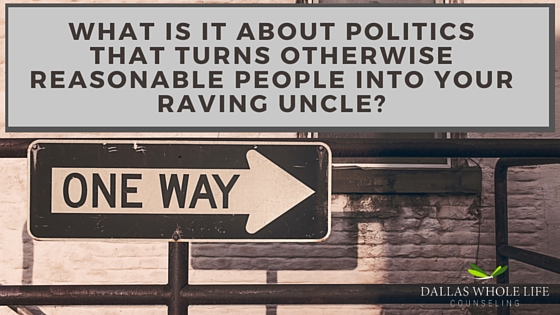
With the upcoming election looming, many of my clients have been riled up about this or that politician. I ask them to try an exercise. Suppose you hate Politician X. I ask you to read a short article of your own choosing about that politician–but it has to be an article written by a supporter of Politician X. You simply have to briefly and accurately summarize the article, just like giving a book report in second grade. Does it surprise you to know that almost no one actually completes this exercise? People “can’t find” an article, they “forget,” their dog ate their homework, whatever.
What is it about politics that turns otherwise sane and reasonable people into your raving drunk uncle? It’s not really about politics. That’s the first thing to understand.
Authority Issues
Like it or not, politicians have authority. They make laws that directly effect your daily life. Of course you want to know if you can trust these people. But who were your first authority figures in life? The people who raised you. And your parents didn’t even have to be elected to get the gig. At some point in your development–maybe around adolescence–you probably questioned your parent’s “right to govern.” If you didn’t fully work through this healthy questioning and uncertainty at the time (and few of us do), it shows up later in life, but directed toward politicians, bosses, teachers, police officers, etc. For instance, are you furious at Politician X because you feel he or she is dishonest? Consider that rage is always something very personal. Ask yourself if, at some point growing up, you felt that one of your caretakers wasn’t fully honest with you. If your father cheated on your mother, for example, try to recognize your unresolved anger toward your father. You’ll never resolve family issues by bursting a blood vessel every time you see Politician X on TV.
Degree of Influence
Many political issues come down to a matter of government’ “size” or reach. How involved do you feel the government should be in your life? Forget about Republican versus Democrat for a moment. Instead, ask yourself whether your parents were sometimes too involved, or not involved enough, when you were growing up. For example, was your mother an anxious, overly protective caretaker? This could easily foster negative feelings toward “big government” as an adult. Or did your father work long hours, so that you barely ever saw him? Maybe you feel “small government” won’t do enough to take care of your basic needs.
Your political views are likely shaped unconsciously. In fact, your most “passionate” political views may reflect your childhood challenges more than they do your careful, objective research into whatever political issue. This is why most folks would rather hold on to their irrational rage toward Politician X rather than read an article about his or her viewpoints.
About the Author: James Robbins is a licensed professional counselor, published author and co-owner of Dallas Whole Life Counseling. He has over 15 years of experience helping people in various life stages that come from a wide variety of cultural, economic and family backgrounds. Learn more about his background by clicking here.


Leave a Reply
You must be logged in to post a comment.